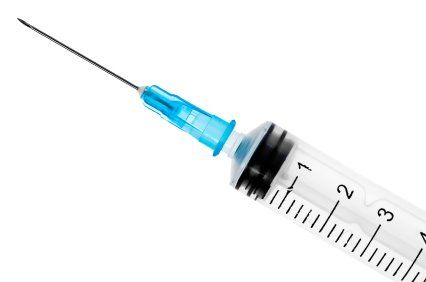MAGE-A3 Lung Cancer Vaccine Provides No Benefit Over Placebo
The MAGRIT trial showed no benefit with the recMAGE-A3 + AS15 cancer immunotherapeutic compared with placebo in completely resected, MAGE-A3-positive NSCLC.
With these results, the future of lung cancer vaccines is very much in doubt.

The future of lung cancer vaccines is very much in doubt as results of the large, randomized MAGRIT trial have been presented. The trial showed no benefit with the recMAGE-A3 + AS15 cancer immunotherapeutic (MAGE-A3 CI) compared with placebo in completely resected, MAGE-A3-positive non–small-cell lung cancer (NSCLC).
Lung cancer immunotherapeutics are intended to improve poor outcomes in stage II and IIIA NSCLC; the current standard of care is adjuvant chemotherapy, but the 5-year disease-free survival remains below 50%. The MAGRIT trial, which was stopped earlier this year due to futility, randomized 2,272 MAGE-A3-positive patients to either MAGE-A3 CI or placebo and followed them for a median of 38.8 months. Final results were presented at the European Society of Medical Oncology (ESMO) 2014 Congress in Madrid.
The median disease-free survival was 60.5 months in the MAGE-A3 CI patients compared with 57.9 months in the placebo patients, for a hazard ratio of 1.024 (95% CI, 0.891-1.177; P = .7379). Just over half the cohort (52%) received adjuvant chemotherapy as well; in those patients who did not receive adjuvant chemotherapy, the median disease-free survival was 58 months for MAGE-A3 CI patients and 56.9 months for placebo patients. There was no difference in the rate of grade 3 adverse events between the groups.
“It was a very large study, but unfortunately the survival curves are superimposed,” said lead author Johan F. Vansteenkiste, MD, PhD, of Catholic University Leuven in Belgium, in a press release. “MAGRIT was the largest therapeutic trial ever done in NSCLC. It joins the list of failures in the last 10 years to find an adjuvant treatment that improves outcome after lung cancer surgery.”
Vansteenkiste did note that the MAGE-A3 vaccine could still provide benefit if combined with immune checkpoint inhibitors that reverse a tumor’s immunosuppressive effects. Martin Reck, MD, PhD, of the Hospital Grosshansdorf in Germany, commented on the study and agreed that other approaches may be necessary. “If any immunotherapeutic approach was going to work, it should have been in this setting and the results are therefore a big disappointment,” Reck said. “The concept of vaccination in lung cancer has to be questioned and checkpoint inhibition might be pursued instead.”
Another phase III lung cancer vaccine trial, using a therapeutic known as belagenpumatucel-L, also failed to meet its primary endpoint last year, but researchers said it showed enough promise to merit further development.